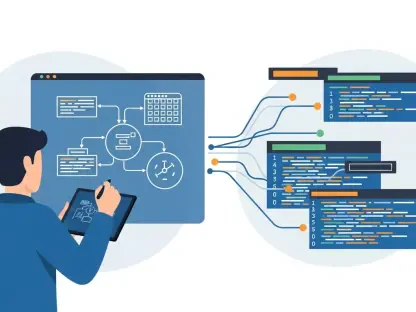SensiML has set an ambitious goal with the launch of Piccolo AI, its open-source AutoML solution tailored for Edge AI applications in the IoT sphere. This move aims to democratize access to advanced machine learning models, making it easier for IoT developers to create intelligent, sensor-based inference models. Traditionally, developing these models required a high level of expertise in data science and machine learning, making it difficult for many developers to participate. By opening up Piccolo AI, SensiML is making a strategic move to lower these barriers, thereby fostering greater innovation and broader access to sophisticated technology.
The introduction of Piccolo AI is significant because it aligns with the broader trend of making advanced technological tools available to a wider audience. Democratizing access to machine learning not only enhances innovation but also increases the diversity of applications that can be created. More developers can now contribute and benefit from the platform, leading to more robust and versatile AI models for IoT applications. Piccolo AI’s flexibility is a game-changer for IoT developers, supporting a variety of edge AI applications, including acoustic event detection and human activity recognition. This makes it an invaluable tool for numerous use cases and sets a new standard in the industry.
Democratizing Access to Edge AI Tools
By releasing Piccolo AI as an open-source project, SensiML is uniquely positioned to lower the barriers to creating complex machine learning models. Traditionally, developing these models required significant expertise in data science and machine learning, but Piccolo AI’s open-source nature means anyone can access and explore its capabilities. This democratization is vital for a more inclusive technological ecosystem, allowing even those with limited resources and technical know-how to leverage advanced AI tools for their projects.
The move is especially important as it coincides with the broader trend of making advanced technological tools accessible to a broader audience. This initiative will lead to greater innovation, as a larger pool of developers can contribute to and benefit from the platform. As more users engage with Piccolo AI, the diversity of applications will expand, resulting in more robust and versatile AI models for IoT applications. The platform’s flexibility is a major asset for IoT developers, supporting a range of edge AI applications, including acoustic event detection and human activity recognition.
One of the standout features of Piccolo AI is its versatility. This flexibility not only caters to a range of edge AI applications but also ensures that the platform is accessible to users with varying levels of expertise. Whether you are a novice or an experienced developer, Piccolo AI provides the tools necessary for creating sophisticated AI models. This makes it an invaluable tool for numerous use cases, setting a new standard for the industry and enhancing the potential for innovation.
Tackling TinyML Ecosystem Challenges
The TinyML field faces significant hurdles, particularly regarding data availability and tool fragmentation. Piccolo AI addresses these issues head-on, offering methodologies for data augmentation, transfer learning, and synthetic data generation to overcome data collection bottlenecks. The scarcity of data often impedes the development of effective machine learning models. Therefore, methods that mitigate these challenges without requiring massive datasets are transformative for the industry.
One of the principal challenges in TinyML is data scarcity, which often impedes the development of effective machine learning models. By promoting community-driven approaches to data augmentation and synthetic data generation, Piccolo AI reduces reliance on costly and difficult-to-obtain large datasets. This is particularly pertinent in the IoT space, where data collection can be resource-intensive and expensive. By providing tools that simplify these processes, Piccolo AI enables more rapid and efficient development of AI models, thus accelerating innovation.
Another critical feature of Piccolo AI is its ability to integrate various tools, creating a more cohesive development environment. This reduces the steep learning curve often associated with machine learning, allowing developers to focus more on innovation and less on technical barriers. Tool fragmentation is a significant issue in the TinyML ecosystem, with developers often needing to use multiple, incompatible tools. Piccolo AI’s integrated approach mitigates this challenge by providing a unified platform for development, making it easier for developers to create and deploy AI models.
Versatility and Ease of Use
One of the most compelling features of Piccolo AI is its versatility, catering to both novice and experienced users. The no-code graphical interface allows users with limited technical expertise to create robust AI models, making machine learning more accessible than ever before. This democratization ensures that even those without a background in data science or machine learning can leverage the power of AI. At the same time, the platform’s Python SDK offers a more granular level of control, giving experienced developers the flexibility to tailor their models to specific needs.
The dual approach of offering both a no-code graphical interface and a Python SDK ensures that Piccolo AI can serve a wide range of users, from hobbyists to enterprise-level professionals. This inclusivity is crucial for fostering a diverse community of developers who can contribute to and benefit from the platform. Moreover, the compact model sizes, which can be as small as 5KB, are particularly noteworthy. These smaller models are ideal for IoT applications, where devices often have limited memory and processing power, making Piccolo AI a highly practical solution for real-world applications.
The practical implications of Piccolo AI’s design cannot be understated. For IoT applications, where devices often have limited memory and processing power, the ability to generate highly compact models is invaluable. These models enable more efficient use of resources, making it feasible to deploy complex AI algorithms even on constrained hardware. This practical utility, combined with its versatility and ease of use, positions Piccolo AI as a leading tool in the edge AI space, setting the stage for significant advancements in the field.
Benefits of Open-Source Approach
SensiML’s decision to go open-source with Piccolo AI is a strategic one, inspired by the success of projects like TensorFlow and PyTorch. Open-source software encourages global collaboration, which can lead to innovative solutions and rapid advancements in technology. The transparency provided by open-source software also enhances security, as the code undergoes extensive peer review. This collective scrutiny helps to identify and fix vulnerabilities, resulting in a more secure platform.
The open-source nature of Piccolo AI fosters a sense of community among developers. This creates an environment conducive to sharing ideas, collaborating on projects, and collectively advancing the technology. Developers can contribute to the platform, enhancing its features and functionality, resulting in a more robust and versatile tool. This collaborative approach significantly accelerates the pace of innovation and improvement, making Piccolo AI a rapidly evolving and highly effective solution for edge AI applications.
Furthermore, the open-source model aligns with SensiML’s broader mission of democratizing access to advanced machine learning tools. By making Piccolo AI available to everyone, SensiML ensures that even those with limited resources can benefit from state-of-the-art AI technology. This inclusive approach not only promotes greater equity within the tech community but also drives further innovation by tapping into a more diverse pool of talent. The benefits of this open-source strategy are thus multifaceted, enhancing both the platform itself and the broader ecosystem of edge AI development.
Dual Licensing for Flexibility
The move to offer Piccolo AI with dual licensing—both open-source and managed cloud SaaS—caters to a broad spectrum of users. Hobbyists and smaller developers can benefit from the free, open-source version, while enterprises can opt for the managed cloud SaaS version if they require additional support and features. This dual approach ensures that Piccolo AI remains accessible to everyone while still providing a viable path for monetization and sustainability.
By accommodating various needs and preferences, SensiML’s dual licensing model ensures that Piccolo AI can serve a diverse and growing user base, thereby promoting widespread adoption and innovation. The open-source version makes advanced AI tools accessible to individuals and small teams, enabling grassroots innovation and experimentation. At the same time, the managed cloud SaaS version offers enterprises the reliability and support they need for larger, mission-critical projects. This flexibility is crucial for fostering a diverse ecosystem of users who can all contribute to the platform’s growth.
The dual licensing model strikes a balance between democratizing access and maintaining a high level of service for those who need it. Enterprises often require additional features, enhanced support, and guaranteed uptime, which the managed cloud SaaS version can provide. This ensures that Piccolo AI remains a viable option for all users, from hobbyists to large corporations. By providing options that cater to different needs, SensiML can support a broad range of use cases while ensuring the platform’s sustainability and continued development.
Future Directions and Expansions
SensiML has set a high bar with the launch of Piccolo AI, its open-source AutoML solution designed for Edge AI applications within the IoT domain. This initiative seeks to democratize access to advanced machine learning models, simplifying the creation of intelligent, sensor-based inference models for IoT developers. Traditionally, crafting these models required extensive expertise in data science and machine learning, posing challenges for many developers. By releasing Piccolo AI, SensiML is strategically lowering these barriers, promoting greater innovation and expanding access to sophisticated technology.
The rollout of Piccolo AI is crucial as it aligns with the broader movement to make advanced tech tools more accessible. By democratizing machine learning, innovation is not only enhanced but a wider variety of applications can be developed. More developers can now contribute to and benefit from the platform, resulting in more robust and versatile AI models for IoT applications. Piccolo AI’s adaptability is revolutionary for IoT developers, supporting various edge AI applications, like acoustic event detection and human activity recognition. This tool is invaluable, setting a new standard for the industry.









